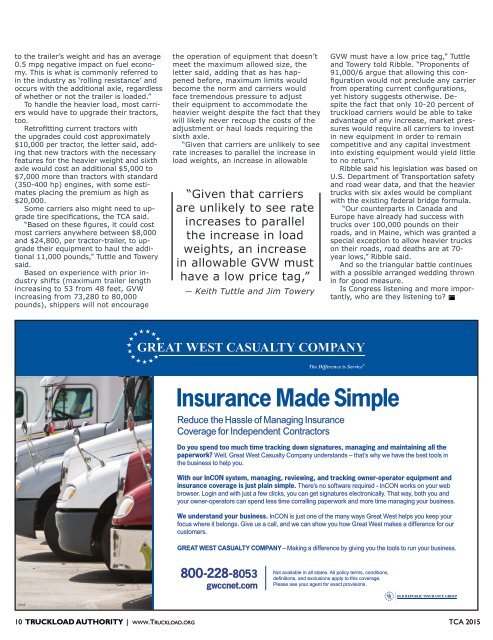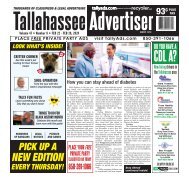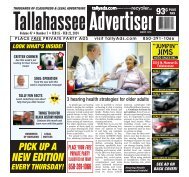Truckload Authority - Fall 2015
We take you inside the twin 33 debate and the CDL scandal that rocked California. Plus, you will meet a true American hero. It's all in this edition
We take you inside the twin 33 debate and the CDL scandal that rocked California. Plus, you will meet a true American hero. It's all in this edition
You also want an ePaper? Increase the reach of your titles
YUMPU automatically turns print PDFs into web optimized ePapers that Google loves.
to the trailer’s weight and has an average<br />
0.5 mpg negative impact on fuel economy.<br />
This is what is commonly referred to<br />
in the industry as ‘rolling resistance’ and<br />
occurs with the additional axle, regardless<br />
of whether or not the trailer is loaded.”<br />
To handle the heavier load, most carriers<br />
would have to upgrade their tractors,<br />
too.<br />
Retrofitting current tractors with<br />
the upgrades could cost approximately<br />
$10,000 per tractor, the letter said, adding<br />
that new tractors with the necessary<br />
features for the heavier weight and sixth<br />
axle would cost an additional $5,000 to<br />
$7,000 more than tractors with standard<br />
(350-400 hp) engines, with some estimates<br />
placing the premium as high as<br />
$20,000.<br />
Some carriers also might need to upgrade<br />
tire specifications, the TCA said.<br />
“Based on these figures, it could cost<br />
most carriers anywhere between $8,000<br />
and $24,800, per tractor-trailer, to upgrade<br />
their equipment to haul the additional<br />
11,000 pounds,” Tuttle and Towery<br />
said.<br />
Based on experience with prior industry<br />
shifts (maximum trailer length<br />
increasing to 53 from 48 feet, GVW<br />
increasing from 73,280 to 80,000<br />
pounds), shippers will not encourage<br />
the operation of equipment that doesn’t<br />
meet the maximum allowed size, the<br />
letter said, adding that as has happened<br />
before, maximum limits would<br />
become the norm and carriers would<br />
face tremendous pressure to adjust<br />
their equipment to accommodate the<br />
heavier weight despite the fact that they<br />
will likely never recoup the costs of the<br />
adjustment or haul loads requiring the<br />
sixth axle.<br />
“Given that carriers are unlikely to see<br />
rate increases to parallel the increase in<br />
load weights, an increase in allowable<br />
“Given that carriers<br />
are unlikely to see rate<br />
increases to parallel<br />
the increase in load<br />
weights, an increase<br />
in allowable GVW must<br />
have a low price tag,”<br />
— Keith Tuttle and Jim Towery<br />
GVW must have a low price tag,” Tuttle<br />
and Towery told Ribble. “Proponents of<br />
91,000/6 argue that allowing this configuration<br />
would not preclude any carrier<br />
from operating current configurations,<br />
yet history suggests otherwise. Despite<br />
the fact that only 10-20 percent of<br />
truckload carriers would be able to take<br />
advantage of any increase, market pressures<br />
would require all carriers to invest<br />
in new equipment in order to remain<br />
competitive and any capital investment<br />
into existing equipment would yield little<br />
to no return.”<br />
Ribble said his legislation was based on<br />
U.S. Department of Transportation safety<br />
and road wear data, and that the heavier<br />
trucks with six axles would be compliant<br />
with the existing federal bridge formula.<br />
“Our counterparts in Canada and<br />
Europe have already had success with<br />
trucks over 100,000 pounds on their<br />
roads, and in Maine, which was granted a<br />
special exception to allow heavier trucks<br />
on their roads, road deaths are at 70-<br />
year lows,” Ribble said.<br />
And so the triangular battle continues<br />
with a possible arranged wedding thrown<br />
in for good measure.<br />
Is Congress listening and more importantly,<br />
who are they listening to?<br />
Insurance Made Simple<br />
Reduce the Hassle of Managing Insurance<br />
Coverage for Independent Contractors<br />
Do you spend too much time tracking down signatures, managing and maintaining all the<br />
paperwork? Well, Great West Casualty Company understands – that’s why we have the best tools in<br />
the business to help you.<br />
With our InCON system, managing, reviewing, and tracking owner-operator equipment and<br />
insurance coverage is just plain simple. There’s no software required - InCON works on your web<br />
browser. Login and with just a few clicks, you can get signatures electronically. That way, both you and<br />
your owner-operators can spend less time corralling paperwork and more time managing your business.<br />
We understand your business. InCON is just one of the many ways Great West helps you keep your<br />
focus where it belongs. Give us a call, and we can show you how Great West makes a difference for our<br />
customers.<br />
GREAT WEST CASUALTY COMPANY – Making a difference by giving you the tools to run your business.<br />
800-228-8053<br />
gwccnet.com<br />
Not available in all states. All policy terms, conditions,<br />
<br />
<br />
8546<br />
10 <strong>Truckload</strong> <strong>Authority</strong> | www.<strong>Truckload</strong>.org TCA <strong>2015</strong>

















